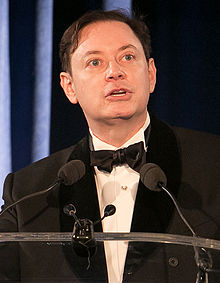Andrew Solomon | |
|---|---|
 Solomon in 2015 | |
| Born | October 30, 1963 Manhattan, New York, US |
| Education | Horace Mann School Yale University (BA) University of Cambridge (MA, PhD) |
| Occupation | Writer |
| Website | andrewsolomon |
Andrew Solomon (born October 30, 1963) is an American writer on politics, culture and psychology, who lives in New York City and London. He has written for The New York Times, The New Yorker, Artforum, Travel and Leisure, and other publications on a range of subjects, including depression,[1] Soviet artists,[2] the cultural rebirth of Afghanistan,[3] Libyan politics,[4][5] and Deaf politics.[6]
Solomon's book The Noonday Demon: An Atlas of Depression[7] won the 2001 National Book Award,[8] was a finalist for the 2002 Pulitzer Prize,[9] and was included in The Times list of one hundred best books of the decade.[10] Honors awarded to Far from the Tree: Parents, Children, and the Search for Identity include the 2012 National Book Critics Circle Award,[11] the Media for a Just Society Award of the National Council on Crime and Delinquency,[12] the Anisfield-Wolf Book Award,[13] the Dayton Literary Peace Prize,[14] the J. Anthony Lukas Book Prize,[15] and the Wellcome Book Prize.[16]
Solomon is a professor of clinical psychology at Columbia University Medical Center,[17] a lecturer at Yale School of Medicine,[18] and a past President of PEN American Center.[19][20]
- ^ Solomon, Andrew (May 6, 2001). "A Cure for Poverty". The New York Times Magazine.
- ^ Solomon, Andrew (July 28, 1993). "Young Russia's Defiant Decadence". The New York Times Magazine.
- ^ Solomon, Andrew (March 10, 2002). "An Awakening From the Nightmare of the Taliban". The New York Times Magazine.
- ^ Solomon, Andrew (May 28, 2006). "Circle of Fire: Letter from Libya". The New Yorker.
- ^ Solomon, Andrew (February 21, 2011). "How Qaddafi Lost Libya". The New Yorker.
- ^ Solomon, Andrew (August 28, 1994). "Defiantly Deaf". The New York Times Magazine.
- ^ "The Noonday Demon" (book website). Retrieved February 10, 2012.
- ^ Awards, National Book Foundation, 2001, retrieved February 20, 2012 (With acceptance speech by Solomon.)
- ^ The Pulitzer Prizes (2002). "Nominated Finalists". Retrieved February 10, 2012.
- ^ "The 100 Best Books of the Decade". The Times. London. November 14, 2009.(subscription required)
- ^ Hoffer, Barbara (February 28, 2013). "National Book Critics Circle Announces Awards for Publishing Year 2012". Critical Mass (press release). Archived from the original on March 4, 2013. Retrieved October 3, 2013.
- ^ National Council on Crime & Delinquency (June 20, 2013). "The Winners of the 20th Annual Media for a Just Society Awards" (press release). Archived from the original on December 15, 2016. Retrieved October 3, 2013.
- ^ Anisfield-Wolf Book Award (April 22, 2013). "Andrew Solomon Wins the 2013 Anisfield-Wolf Prize for Nonfiction" (press release). Retrieved October 3, 2013.
- ^ Moss, Meredith (September 24, 2013). "2013 Dayton Literary Peace Prize winners announced". Dayton Daily News. Retrieved October 3, 2013.
- ^ Charles, Ron (April 18, 2013). "Andrew Solomon wins Lukas Book Prize". Washington Post.
- ^ "Far from the Tree by Andrew Solomon wins the Wellcome Book Prize 2014". Wellcome Trust. April 30, 2014. Archived from the original on April 17, 2015. Retrieved April 17, 2015.
- ^ Glasberg, Eve (March 27, 2015). "Literary Lion: 5 Questions with Nonfiction Writer Andrew Solomon". Columbia News. Archived from the original on April 17, 2015.
- ^ Yale School of Medicine. "Andrew Solomon, PhD". Retrieved August 23, 2021.
- ^ PEN American Center (March 5, 2015). "Author Andrew Solomon Assumes Presidency of PEN American Center" (press release).
- ^ "Current Board of Trustees (2018-2019)". PEN America. September 20, 2016. Retrieved March 28, 2018.